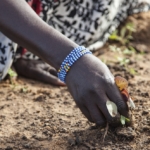


Institut de l'Environnement et de Recherches Agricoles
2/2013—2/2015
Bambara nut (Vigna subterranea (L.) Verdc.) is an important traditional legume crop in West Africa, grown mainly by female smallholder farmers for household nutrition, selling at local markets for income generation, and for cultural ceremonies. In Burkina Faso, bambara nut production is characterized by low and erratic yields around 650 kg per hectare. The first phase of the CCRP-funded bambara nut project identified promising varieties and agronomic techniques that have the potential to enhance bambara nut productivity in different zones of Burkina Faso. The present phase II of the project builds on and extends these important achievements.
The overall goal of this second phase is to improve the productivity of bambara nut in the Soudanian, Soudano-Sahelian and Sahelian ecological zones of Burkina Faso, and thereby to contribute to enhanced food security and income generation for smallholder farmers, especially women. Specific objectives of the project are to: (i) spread within different agro-ecological zones in Burkina Faso suitable agricultural techniques that increase productivity and production of bambara nut and, (ii) enhance farmers’ income by improving the link between production and marketing. Understanding climatic factors affecting the fungal and virus disease appearance in bambara nut, identification of resistance sources, and determining the crop’s role in contributing to soil fertility enhancement in a crop rotation are further intended outputs of the project. To achieve the project outputs, a multi-disciplinary team of INERA is working in a participatory manner with up to 30 women farmer groups in Burkina Faso.The project expects to impact positively on the following factors:Environment and soil fertility: the enhanced N-fixation due to enhanced bambara nut integration in the agricultural production systems of Burkina Faso is expected to contribute to sustainable maintenance of soil fertility;Economics of smallholder families: the enhanced bambara nut productivity is expected to result into better incomes especially for women farmers; also the seed production activities are expected to strengthen bambara nut seed markets and income generation opportunities from seeds in Burkina Faso;Nutrition: higher bambara nut productivity and integration in the daily food is expected to have positive nutritional outcomes because of high protein contents in bambara nut; the enhanced income generation from bambara nut can also contribute indirectly to more diversified diets due to better purchasing power of the women;Women empowerment: by strengthening the partner women farmer organizations in bambara nut production and marketing including seed production, the women organizations will gain self-confidence and become also more professional/better organized in other activities.

